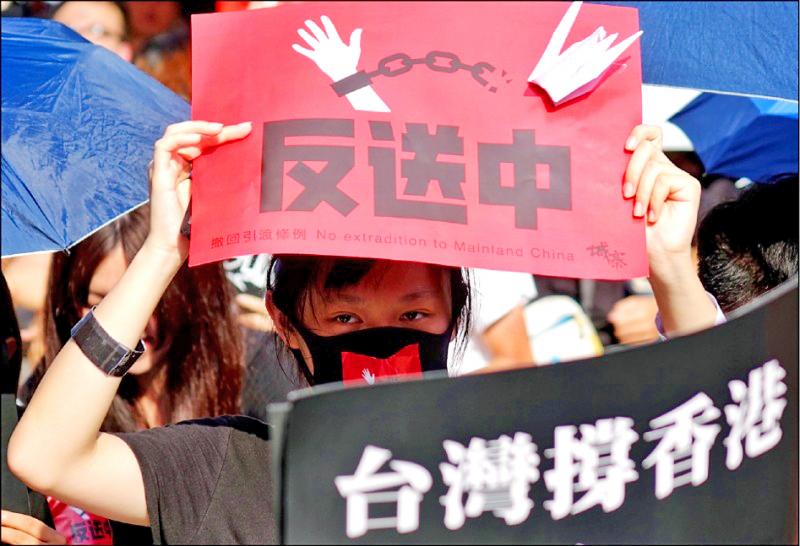About 200 Hong Kong protesters have come to Taiwan to immigrate for “political reasons” since June last year, and authorities accepted the applications of about 20 of them, Taiwan Association for Human Rights secretary-general Shih Yi-hsiang (施逸翔) said on Tuesday.
The approvals followed investigations by the Mainland Affairs Council and the National Immigration Agency, he said.
The applications were made according to Article 18 of the Act Governing Relations with Hong Kong and Macau (香港澳門關係條例), Shih said.

Photo: Chung Li-hua, Taipei Times
“However, there is still a significantly larger number of people waiting for their cases to be processed,” he added.
The article stipulates that: “Necessary assistance shall be provided to Hong Kong or Macau residents whose safety and liberty are immediately threatened for political reasons.”
However, due to the politically sensitive nature of the issue and its implications for cross-strait relations, the government has not publicized information about the cases handled according to the article.
The Presbyterian Church in Taiwan has since July last year provided assistance to more than 200 Hong Kongers, Pastor Huang Chun-sheng (黃春生) said, adding that their ages ranged from one to more than 50.
Some of them were protesters who were ordered by Hong Kong police to appear in court, but they instead fled to Taiwan with lightly packed bags before their court date, he said.
“They showed up at the church in the winter wearing nothing but short-sleeved shirts and sandals, asking for help,” he said.
The church mainly provided shelter and psychological guidance to the protesters seeking help, Huang said, adding that it also helped some of them find accommodation or enroll in schools.
“We helped one person apply to a medical school, and a Taiwanese doctor offered to help pay their tuition and stick with them through their study,” he said.
As the church was not familiar with the protesters’ backgrounds, it asked Daniel Wong (黃國桐), a Hong Kong lawyer and politician who provided volunteer legal services to protesters last year, to interview them, Huang said.
The church helped those who were determined to take risks to stay in Taiwan, Huang said.
If they apply for immigration through Article 18, their case would undergo three evaluations, he said.
However, as the article is not clearly worded, most applications get processed only if they are handed over to authorities by someone on behalf of the applicant, Huang said.
Lin Chun-hung (林俊宏), a Taiwanese lawyer who represents Hong Kong protesters hoping to immigrate to Taiwan, said that residency cases for Hong Kong applicants vary in complexity depending on the method the applicant uses.
Those who apply as students are easily processed, while those who apply for work permits must first find an employer and a job with a monthly salary of at least NT$47,000, he said.
Cases involving dual citizenship, dependent family members or same-sex couples — which are not legally recognized in Hong Kong — are more complex, he said.
The rules must be more clearly defined so that a system can be followed when processing applications from prospective Hong Kong immigrants, he said.

The manufacture of the remaining 28 M1A2T Abrams tanks Taiwan purchased from the US has recently been completed, and they are expected to be delivered within the next one to two months, a source said yesterday. The Ministry of National Defense is arranging cargo ships to transport the tanks to Taiwan as soon as possible, said the source, who is familiar with the matter. The estimated arrival time ranges from late this month to early next month, the source said. The 28 Abrams tanks make up the third and final batch of a total of 108 tanks, valued at about NT$40.5 billion

Two Taiwanese prosecutors were questioned by Chinese security personnel at their hotel during a trip to China’s Henan Province this month, the Mainland Affairs Council (MAC) said yesterday. The officers had personal information on the prosecutors, including “when they were assigned to their posts, their work locations and job titles,” MAC Deputy Minister and spokesman Liang Wen-chieh (梁文傑) said. On top of asking about their agencies and positions, the officers also questioned the prosecutors about the Cross-Strait Joint Crime-Fighting and Judicial Mutual Assistance Agreement, a pact that serves as the framework for Taiwan-China cooperation on combating crime and providing judicial assistance, Liang

A group from the Taiwanese Designers in Australia association yesterday represented Taiwan at the Midsumma Pride March in Melbourne. The march, held in the St. Kilda suburb, is the city’s largest LGBTQIA+ parade and the flagship event of the annual Midsumma Festival. It attracted more than 45,000 spectators who supported the 400 groups and 10,000 marchers that participated this year, the association said. Taiwanese Designers said they organized a team to march for Taiwan this year, joining politicians, government agencies, professionals and community organizations in showing support for LGBTQIA+ people and diverse communities. As the first country in Asia to legalize same-sex

MOTIVES QUESTIONED The PLA considers Xi’s policies toward Taiwan to be driven by personal considerations rather than military assessment, the Epoch Times reports Chinese President Xi Jinping’s (習近平) latest purge of the Chinese People’s Liberation Army (PLA) leadership might have been prompted by the military’s opposition to plans of invading Taiwan, the Epoch Times said. The Chinese military opposes waging war against Taiwan by a large consensus, putting it at odds with Xi’s vision, the Falun Gong-affiliated daily said in a report on Thursday, citing anonymous sources with insight into the PLA’s inner workings. The opposition is not the opinion of a few generals, but a widely shared view among the PLA cadre, the Epoch Times cited them as saying. “Chinese forces know full well that